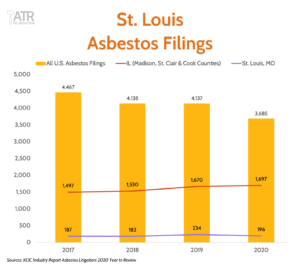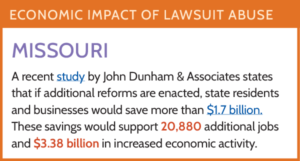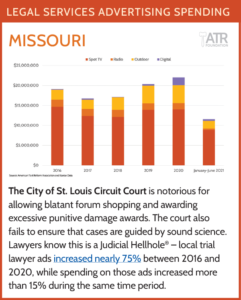PLAINTIFFS’ LAWYERS FLOCK TO ST. LOUIS
Personal injury lawyers flock to St. Louis to file their lawsuits and to take advantage of the plaintiff-friendly judges. These out-of-state plaintiffs clog the city’s courts, drain court resources, and drive businesses out of the state leading to job loss.
Despite the legislature requiring closer scrutiny of proposed expert testimony in 2017 by adopting a standard consistent with federal courts and most other state courts, St. Louis judges have allowed junk science to be heard in their courtrooms. Plaintiffs’ experts, whose testimony has been determined to not be based in science by other state courts, have been permitted to testify in St. Louis courts.
Talc Litigation
In June 2021, the U.S. Supreme Court delivered an important reminder about the importance of states enacting civil justice reform and reining in activist judges. The Court announced that it would not review a landmark talcum powder case (Ingham) which resulted in a multi-billion-dollar verdict out of the City of St. Louis Circuit Court. The Supreme Court grants certiorari in less than 2% of cases and it is dangerous to rely on the high court to police the decisions of rogue state judges.
In July 2018, a City of St. Louis jury awarded $4.69 billion – $550 million in actual damages and $4.14 billion in punitive damages – to a group of 22 plaintiffs. The women claimed that their ovarian cancer was caused by exposure to asbestos allegedly found in Johnson & Johnson’s baby powder. Of the 22 women involved in the lawsuit, 17 had no connection to Missouri. Each was awarded the same amount of money, despite there being different facts for each, and differences in relevant law. After a six-week trial, jurors deliberated for less than a full day before reaching this astounding result.
In June 2020, an appellate court upheld the verdict but reduced the damages award from $4.69 billion to $2.12 billion – $500 million in actual damages and $1.62 billion in punitive damages.
In a very disappointing order in November 2020, the Missouri Supreme Court refused to review the verdict. ATRA had urged the state’s high court to review the case and (1) limit the trial court’s exercise of personal jurisdiction over a case where the defendant and many plaintiffs had little to no connection to the forum state, (2) not allow the trial court to join multiple plaintiffs in a single trial whose only commonality is alleging injury by the same product, and (3) address the constitutionality of the massive punitive dam- ages award.
ATRA also urged the U.S. Supreme Court to review the case, specifically the improper joinder of 22 plaintiffs, each with different medical backgrounds and outcomes, into one case. The Supreme Court should have reviewed this case to provide clearer guidance to lower courts regarding joining such dissimilar claims. The onus is now on the Missouri legislature to enact essential civil justice reforms to ensure the protection of defendants’ due process rights.
The ability for businesses to receive a fair trial in St. Louis may be slowly improving. In September 2021, days after a Philadelphia jury found that Johnson & Johnson’s talcum powder does not cause cancer, a St. Louis Circuit Court jury reached the same conclusion in the first multi-plaintiff talc verdict following Johnson & Johnson v. Ingham. Each of the three plaintiffs had a different condition: Susan Vogeler has clear-cell cancer, Victoria Giese has low-grade cancer, and Debra Marino had high-grade cancer. Allen Smith, who represented the women, sought $923 million in damages. The jury concluded that baby powder could not have caused all three cancer variations.
Roundup Litigation
St. Louis, along with fellow Judicial Hellhole® California, is home to tens of thousands of lawsuits against Bayer AG involving its Roundup® weedkiller. All of them allege that the active ingredient, glyphosate, causes non-Hodgkin lymphoma. Law firms across the country are flocking to St. Louis to file their lawsuits. As of July 2021, California-based Singleton Law Firm had approximately 400 Roundup® cases pending in Missouri. Another prominent player is Kirkendall Dwyer LLP, a Texas-based firm.
Facing mounting lawsuits generated by a barrage of lawsuit advertising, the cost and risk of trials, and harm to its business, in June 2020, Bayer settled around 95,000 of the 125,000 claims for more than $10 billion.
In May of 2021, Judge Vince Chhabria of the U.S. District Court for the Northern District of California rejected a $2 billion class action proposal to settle future claims alleging that Roundup® causes cancer.
St. Louis Roundup® trials have been delayed due to the settlement discussions; however, all one must do is examine the trials in California to understand the plaintiffs’ lawyers’ playbook. The foundation of the litigation is a “junk science” report by the International Agency for Research on Cancer (IARC) that classified glyphosate, the active ingredient in the herbicide Roundup®, as “probably carcinogenic.” IARC is a specialized cancer agency of the World Health Organization, known to be outmoded, heavily politicized, and sub-standard in the quality of its science. The IARC report was the basis for a San Francisco jury to enter a jury award of more than $289 million against Monsanto. IARC’s classification is in stark contrast to more than 800 scientific studies as well as analyses by the U.S. Environmental Protection Agency, Health Canada, and the National Institutes of Health.
Asbestos Litigation
While much-needed asbestos trust transparency legislation continues to stall in the Missouri legislature, St. Louis remains a preferred jurisdiction for the plaintiffs’ bar. St. Louis once again was in the Top-10 for the most asbestos cases filed overall (5th), and the most mesothelioma (8th) and lung cancer (3rd) filings in 2020. As of April 2021, nationwide law- suits alleging exposure to asbestos caused a person’s lung cancer were up 29% compared to that time last year. By comparison, in St. Louis, lung cancer filings were up 74%.

Asbestos trust transparency legislation would prevent plaintiffs’ lawyers from alleging that solvent companies are responsible for their clients’ exposure to asbestos in order to obtain compensation from trusts set up by those companies, then hiding this information when suing insolvent companies in court. Several states have enacted similar laws and it would make St. Louis a less attractive venue for plaintiffs’ lawyers.
 A perennial Judicial Hellhole®, St. Louis once again finds itself on the list; however, made some important progress through legislative reforms. But while the legislature has prioritized civil justice reform, there is more work to be done.
A perennial Judicial Hellhole®, St. Louis once again finds itself on the list; however, made some important progress through legislative reforms. But while the legislature has prioritized civil justice reform, there is more work to be done.







